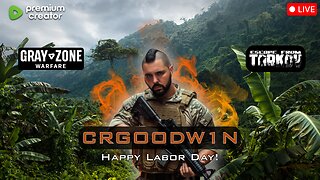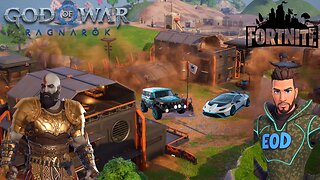Premium Only Content

Principles of Economics by Carl Menger Chapter 2.1 - Human Requirements in Economics
You want to read the book? Get it here: https://amzn.to/4cCPIQs
Watch the next video in this series: https://rumble.com/v6scyz1-principles-of-economics-by-carl-menger-chapter-2.2-available-quantities-of-.html
Watch the video series from the start: https://rumble.com/playlists/I48mBTB4w2c
Watch our video about Carl Menger: https://rumble.com/v61z0l2-carl-menger-the-father-of-austrian-economics-and-subjective-value.html
What drives our demand for goods—and how can we predict what we’ll need in the future?
In this video, we dive into Carl Menger’s analysis of human requirements in Principles of Economics. Menger explains that human needs begin with first-order goods—the essentials like food, shelter, and clothing. Our demand for higher-order goods—like tools, land, and machines—only exists if we still need to produce those first-order goods.
But how do we plan for future needs when we can’t fully predict them? Menger shows that while exact needs may be uncertain, humans still plan ahead using experience, probability, and caution. We stock medicine, build homes big enough for future families, and governments construct roads and schools for the next generation. This forward-thinking behavior defines real economic life.
Another key insight is that production goods only have real demand when all complementary goods are available. You can’t make bread with just flour—you need labor, tools, and more. If one piece is missing, the entire chain breaks down, and theoretical demand becomes useless. Timing also matters: goods must be available in the right period to meet specific needs.
From shoe factories limited by leather shortages to farmers missing harvest deadlines, Menger reveals how understanding what we need, when we need it, and what’s missing is central to managing resources in any society.
❓ Questions This Video Answers:
-What are first-order and higher-order goods?
-How does uncertainty affect future demand planning?
-Why are complementary goods essential for production?
-What makes demand “effective” or inactive?
-How does timing affect the usefulness of goods?
00:00 - Introduction to Human Requirements
00:12 - First-Order Goods
00:42 - Predicting Future Needs
01:36 - Preparing for Uncertainties
02:18 - Growth and Change of Needs
03:12 - Summary of Human Needs
03:25 - Higher-Order Goods
04:10 - Example of Complementary Goods
05:02 - Misunderstanding Complementary Goods
05:55 - The Importance of Time
06:59 - Outro
#EconomicDemand #ProductionPlanning #CarlMenger
-
 2:09:47
2:09:47
Nerdrotic
7 hours ago $4.60 earnedHollywood's Long Dark Summer of the Soul - Nerdrotic Nooner 511
48K2 -
 1:36:05
1:36:05
Side Scrollers Podcast
5 hours agoStreamer ATTACKS Men Then Cries Victim + Pronoun Rant Anniversary + More | Side Scrollers
23.8K -
 12:06
12:06
Liberty Hangout
1 day agoDemocrat Woman Can't Define 'Woman'
42.2K76 -
 LIVE
LIVE
GritsGG
8 hours agoRumble Customs! 3515 Ws! 🫡!
354 watching -
 38:39
38:39
Grant Stinchfield
5 hours ago $2.15 earnedHow Local TV News LOST Its Soul
29.7K3 -
 2:09:51
2:09:51
Badlands Media
16 hours agoBadlands Daily: Sept. 1, 2025 – Trump vs. Big Pharma, Giuliani Crash, and Mortgage Fraud Fallout
68.8K41 -
 1:12:35
1:12:35
theoriginalmarkz
6 hours agoCoffee with MarkZ. 09/01/2025
57.2K14 -
 2:59:48
2:59:48
Wendy Bell Radio
11 hours agoSunday, Bloody Sunday
140K269 -
 1:10:02
1:10:02
crgoodw1n
6 hours agoHAPPY LABOR DAY! Tactical shoosting W/ @BenderOdoyle Ask about !12hr !freshenup !discord
23.5K2 -

ENEMYOFDEATH2012
18 hours agoGod of War Playthrough Pt. 2 and some Fortnite
14.9K